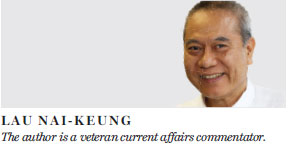Why Hong Kong can never be independent
Updated: 2015-01-20 09:54
By Lau Nai-keung(HK Edition)
|
|||||||
Paragraph three of the latest Policy Address reads, "On economic development, Hong Kong is blessed with the unique advantages of both 'One Country' and 'Two
Systems'. As part of China, we benefit from the rapid development of and enjoy preferential treatment from our country; at the same time, we benefit from having a system that is different from other mainland cities."
The fact that this appears in the Policy Address shows how important Hong Kong's relationship with the mainland really is.
China, or "our country," is not an abstract idea. China is not just a country with a history and a culture (which our dissidents claim they are very fond of). It is also a nation with a concrete social system. The paragraph quoted from the Policy Address emphasizes that Hong Kong is benefiting greatly from the "rapid development of" the mainland. At the same time Hong Kong is also "enjoying preferential treatment from" the mainland.
The Policy Address acknowledges that Hong Kong's economy is growing more slowly than the mainland's. It notes that Hong Kong people would be even worse off were it not for the mainland's development and benevolence. It then says, "We benefit from having a system that is different from other mainland cities."
What exactly does this mean?
Hong Kong and the mainland practice two different systems, but the differences do not always imply "benefits". In fact, readers can only make sense of this statement by making one assumption, and that is the absolute superiority of Hong Kong's "capitalist system".
If the two systems each have their own merits and shortcomings, Hong Kong's system, being different, should have both costs and benefits.
In layman's terms, paragraph three of the Policy Address says, "We are so lucky we are not in the mainland, but at the same time can still benefit from its system." This reflects mainstream thinking in Hong Kong.
Now we can see what is wrong with Undergrad, the official magazine of the Hong Kong University Students' Union. Undergrad advocates that Hong Kong move "to self-reliance and self-determination". But the Policy Address has made it clear that this is simply impossible. Without the "rapid development of" and "preferential treatment from" the mainland's socialist system, Hong Kong could not enjoy the high economic growth it has today.
Some may say that as the mainland's system is producing faster growth, why can't Hong Kong just adopt this system too so it does not have to rely on "preferential treatment", but enjoy such growth directly? There are two alternate answers to this question.
The first answer is the promise the central government made in the Sino-British Joint Declaration in preventing Hong Kong from switching to another system.
Another answer is that if we practiced the same system as the mainland, we could no longer "benefit from having a system that is different from other mainland cities" and receive "preferential treatment".
The Bauhinia Foundation Research Centre has recently released a survey on the "Attitudes of Hong Kong Youth toward Seeking Employment in Mainland China." This revealed that 64.7 percent of young respondents were unwilling to work on the mainland. Only 4.9 percent of those respondents who showed a willingness to seek employment there actually made any effort to do so.
Over half of the respondents unwilling to work on the mainland said it was because of "societal aspects of mainland China" (50.9 percent). Some 18.1 percent said they were "not accustomed to living in the mainland". And 15.1 percent said they "held negative attitudes toward mainland China." The survey found that a "lack of confidence in the rule of law on the mainland" was the main factor deterring local young people from working in there. This accounted for 22.8 percent of respondents.
I can empathize with the respondents' concerns. If young Hong Kong people work on the mainland, they will no longer benefit from living under "a system that is different from other mainland cities". True, there are more career opportunities on the mainland, but street-smart Hong Kong people will let mainlanders take these jobs (and the risks) and then "benefit" from their labor. This would not be possible if Hong Kong became independent.

(HK Edition 01/20/2015 page10)